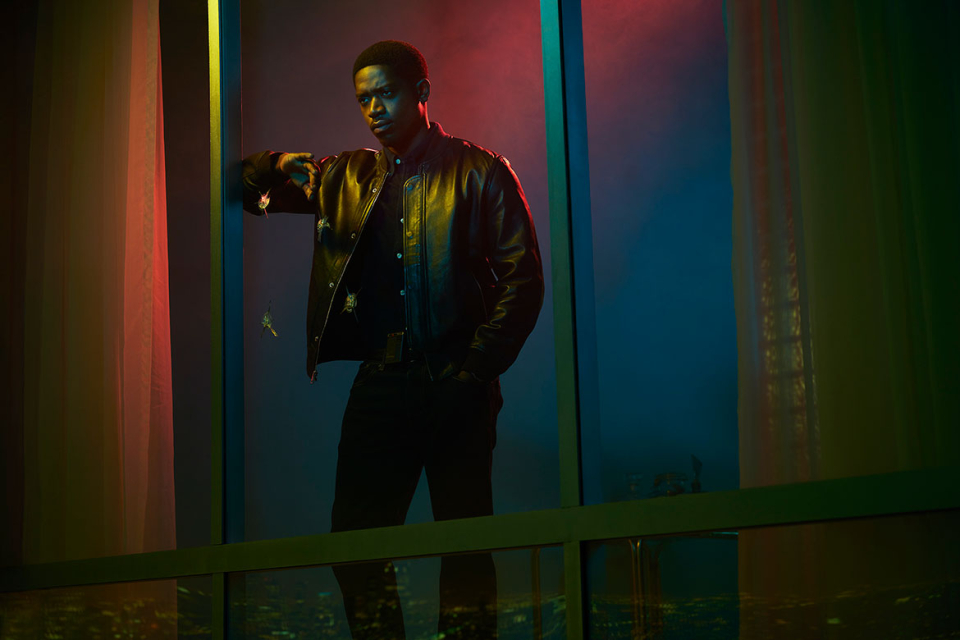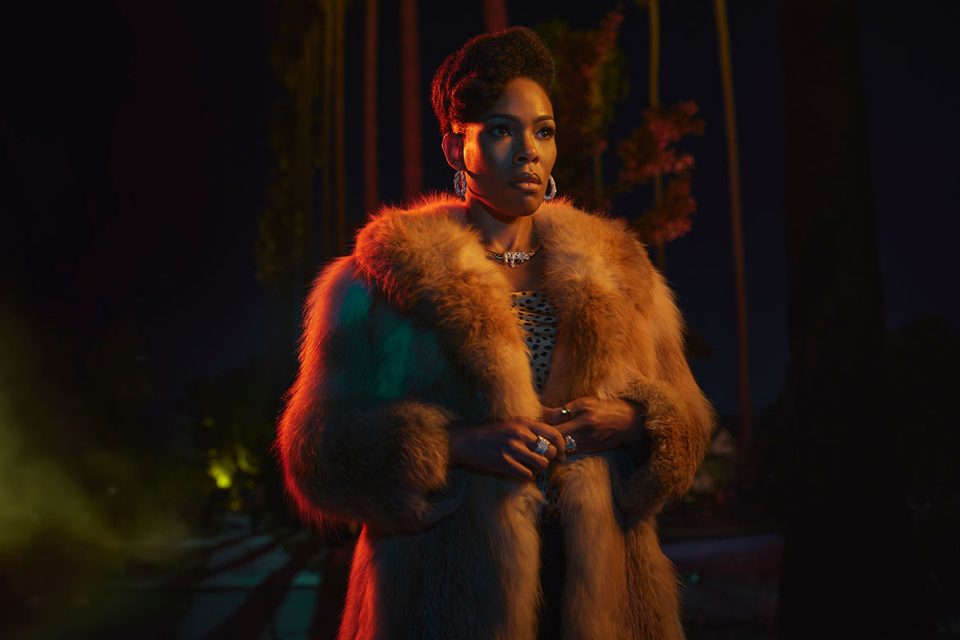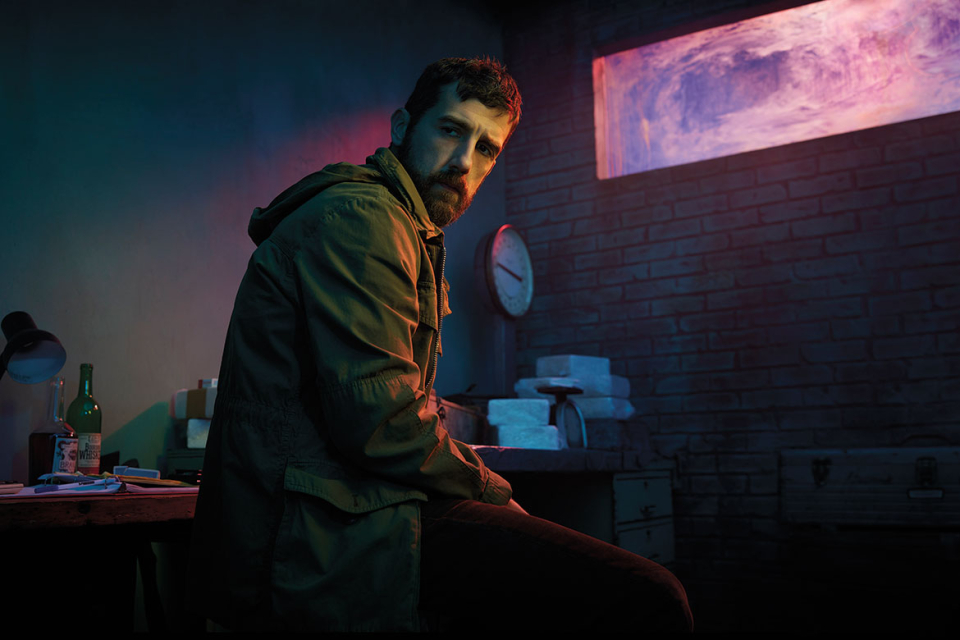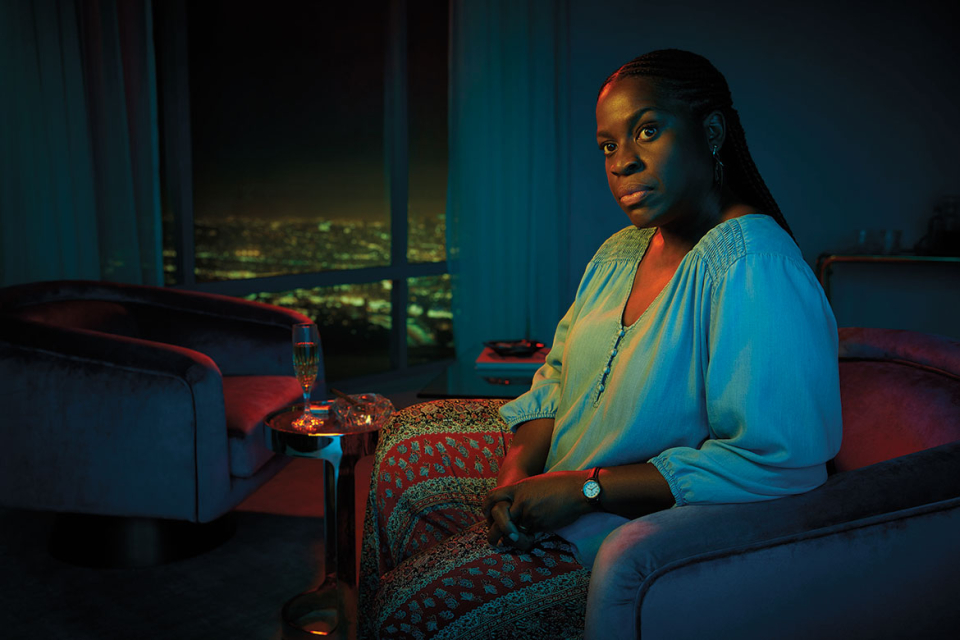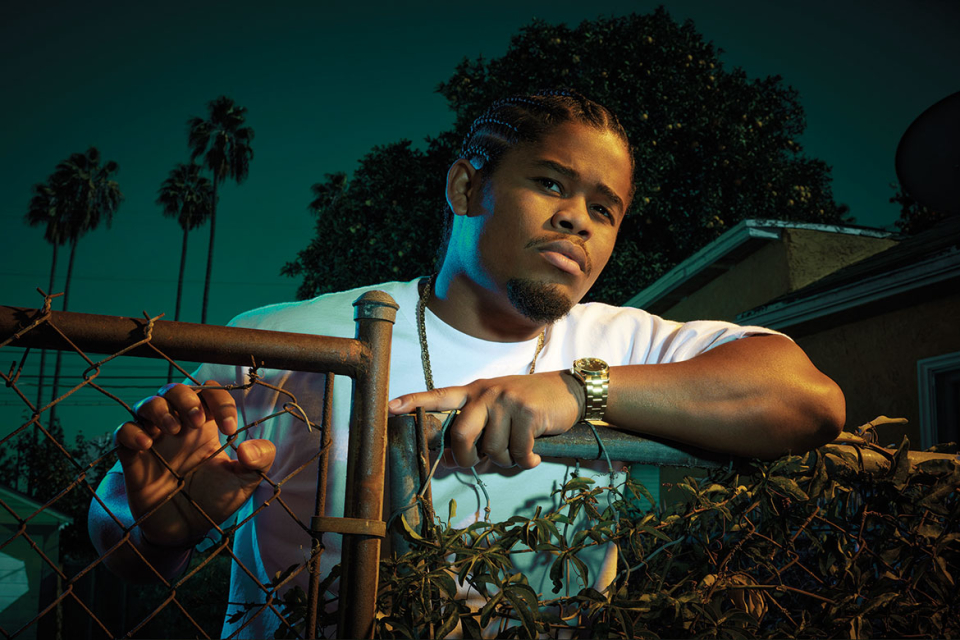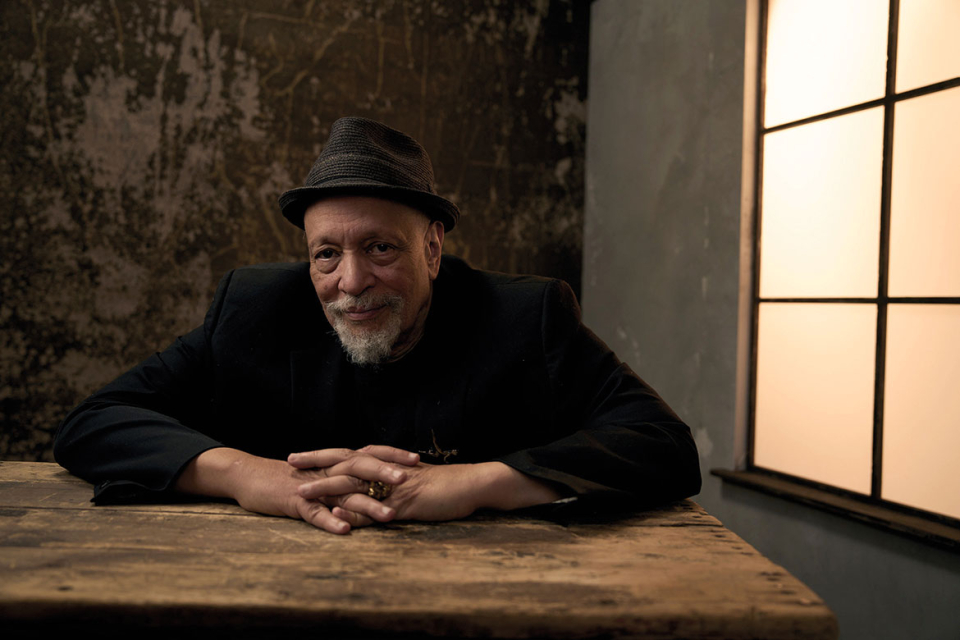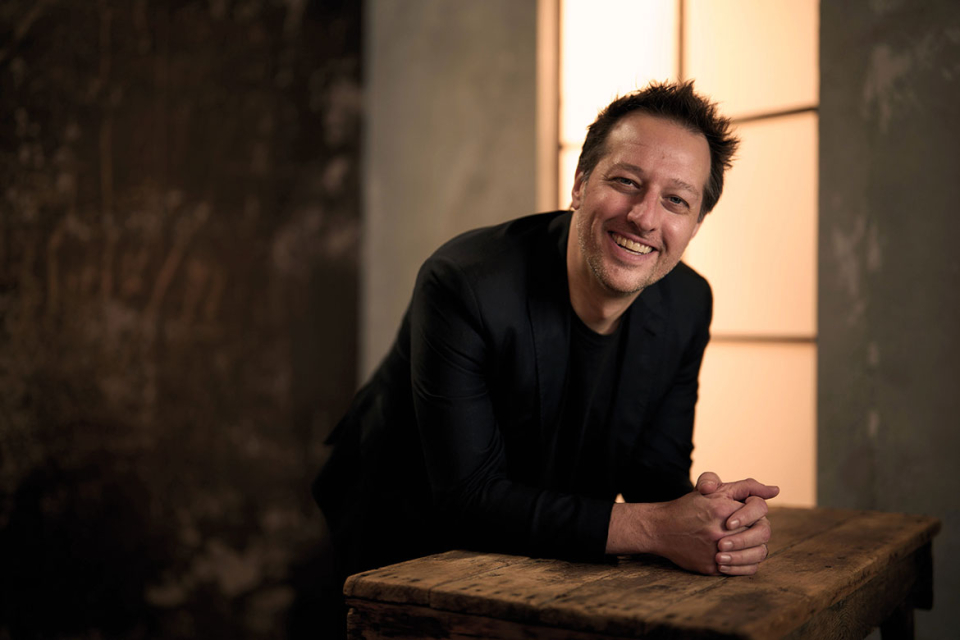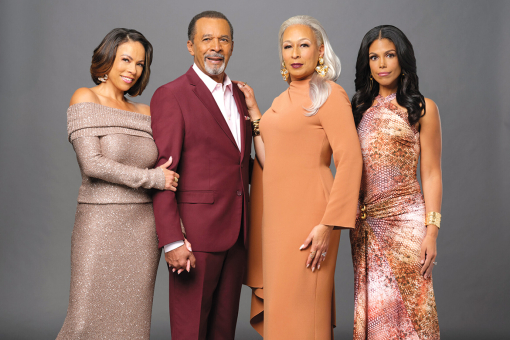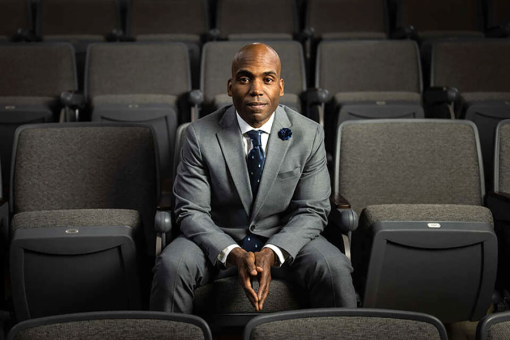Ask Michael Hyatt to describe what happens in the final season of FX's drama Snowfall, and you'll get an explanation that is as direct and powerful as her performance playing Cissy Saint, mother to the show's central character, drug kingpin Franklin Saint.
"Every season there has been some version of shit hits the fan," she says, laughing. "But this season being the end and following John's vision as we're six years into it, it is time for things to fall apart. As things did for many people during this time."
The "John" she speaks of is John Singleton. The famed director of Boyz n the Hood and chronicler of Black life in Los Angeles cocreated Snowfall and served as a creative force behind the scenes until his death in 2019 following a stroke.
Crime novelist Walter Mosley, an executive producer and writer on Snowfall, says the sixth season's direction — Franklin has retaliated against certain family members/business partners by stealing millions from them while preparing to go to war against them — is in line with Singleton's vision.
"When he died, we kept on the path we were already on, because we'd built it with his blessing," says Mosley, who, at Singleton's request, became a story consultant on Snowfall before its 2017 debut.
"He called me and I said, 'John, I don't know anything about television,'" Mosley says, remembering that moment when the filmmaker asked him to help develop this series. "He said, 'That's okay, man, just come in there and back me up.' John had been so generous with us that his passing didn't have as serious an impact on the show, because he had let us do what we wanted to do — and we knew what he wanted us to do."
British-born Damson Idris, who plays Franklin Saint, says Snowfall's final season is all about family — the tensions and competitions inside biological and found family, and how that can all unravel in the face of millions of dollars.
"Family has always been a huge factor in the stories of Snowfall," says Idris, whose personal evolution from talented unknown to experienced series lead mirrors his character's progression from ambitious newcomer to ruthless kingpin. "Now we're looking at characters whose story arcs are ending, and seeing who is going to win and who is going to lose. But since this is the story of how crack cocaine began, we know it's going to end in tragedy."
That has been the series' challenge since its inception: finding new ways to tell a story many people already think they know. When it debuted in 2017, Snowfall focused on an idea some accept as fact and others challenge as a cynical fantasy: that the Central Intelligence Agency helped create Los Angeles's explosive crack cocaine epidemic in the 1990s by connecting the city's drug dealers with suppliers in Mexico and Latin America as a way to finance the agency's own illegal activities.
Idris, Hyatt, Mosley and showrunner–cocreator Dave Andron spoke with emmy contributor Eric Deggans about how Snowfall evolved, Singleton's legacy through the show and how its story is coming to an end.
DAMSON IDRIS, actor: "Franklin Saint"
It's so interesting to watch Franklin Saint in this sixth season and compare that to where he was in the show's first season, as a green kid who knew nothing about the drug game. Do you see similarities between Franklin's journey and your own?
The biggest correlation between myself and Franklin's evolution is confidence. I remember how I felt the first day on set. It was like being thrust into the deep end of some pool and I can't swim. I look back at season one and see an [actor] who was unsure of himself, and Franklin wasn't sure of himself either. In season six, he's got a lot more swagger to him. He knows he's the guy. I still don't believe I'm the guy. But I'm able to play that as Franklin. This is a coming-of-age story for someone who's had horrific circumstances and is a product of his environment. I think a lot of people relate to Franklin and root for him.
Do you have a funny story about when a fan realized you were British?
There's a million. At a party I ran into Lee Daniels [director of The Butler and cocreator of Fox's Empire]. I was with Singleton at the time, and [Daniels] was like, "Man, you killing it on that show." And his eyes popped open when I spoke. Sam Jackson, same thing. Moments like that were really fulfilling for me because this is a show that has unfortunately gone under the radar with regards to awards. But to receive the flowers from these people lets us know this is a show that people are going to talk about for many years to come.
Was it difficult to portray an African American man, as opposed to a British Black man?
My main goal was to make people from that community proud. I constantly got the stamp of approval from Singleton, who lived it, and from Snoop Dogg, Nipsey Hussle, The Game. These icons and pillars who 100 percent of their lives have represented that community. Those are the people who I needed my stamp from. And as soon as I got that, and I got that very quickly, I knew. These are the people that I'm representing. As long as they're good, I know I'm going to be good.
John Singleton and all the creatives emphasized their belief in me, so I was able to lose myself in the character. It was 2015 to 2016 and I was walking around London being Franklin. I was telling everyone in my family, "I'm going to be American, you know. My name's Franklin." My mom was like, "Yeah, whatever, Franklin. Go, do the dishes." [Laughs] But that really helped me. And, you know, that's how I approach every character today. Preparation is key.
What did you learn from working with John Singleton?
He always told me, "Everyone you meet on the way up, you're going to meet on the way down." So he preached humility. He let me know, "Hey, you're a leader and everyone's looking at you." You almost need to be more humble now. I saw him as a big brother, but he really was a great friend and he just wanted you to win. He was just so proud. Anytime I did a good take, anytime I did anything that was remotely successful, he'd run out and give me a fat hug and be like, "That's what I'm talking about, man." I miss him so much, you know? And I see snippets of his spirit in myself and in the crew and everyone that's a part of the show. I know he's always going to be here.
MICHAEL HYATT, actress: "Sharon 'Cissy' Saint"
You get emotional when talking about the end of the show and the stories you're telling here. Why does it touch you so?
We are telling the story of so many people who lived this life and who lived this pain. I'm always brought back to what it must have been like to have been a Black Panther during the '60s and '70s and lived proudly that righteous consciousness with the best of intentions. And then to have been sabotaged by family members to the government. What that must have been like on your psyche? Cissy... she's been through that shit, you know?
How did you come to the series?
I was sent out for an audition. To take all the romance bullshit out of it, it was a job. And it's John Singleton. I was a fan but I was concerned because I had done something like this before [playing Brianna Barksdale on HBO's The Wire]. I didn't want to repeat it. Then John sat down with me and talked about where this was going and what he wanted to do — telling the true stories of the men and women in his community. I mean, he wanted to truly represent the people in a way that our industry just can't do without a John Singleton. They don't have the tools.
When John was alive, his commitment to a truthful story is what kept us going. It was what kept the vision clear. And when John died, there was a moment of... we started off in season four a bit unsure.
Producers were developing season four in 2020, in the early days of the pandemic and during the civil-rights reckoning kicked off by George Floyd's murder. Do you think that had an impact?
The revolution forced us to look at ourselves and correct the behaviors that were wrong. And because of that, season four was much more nuanced. John always said, "Tell your story." John always came with the audacity of saying: "You're going to listen to me because what I have to say has value and you cannot tell my story." We all, without even knowing it, took that on. With the revolution right behind us, giving us the support that we needed, that was the evidence that the industry and the network needed, that it's not just us saying these things. It was a whole world talking about this shit.
WALTER MOSLEY, writer-executive producer
Where is the story as the sixth season begins?
It's a family, more or less, and friends who've come together and built a major industry. And they want to do more. One of them wants to be the queenpin of crack. One of them wants to be Henry Ford. Franklin Saint, he wants a dynasty — like an American capitalist dynasty. His mother just wants them to be free.
What was the challenge of crafting this final season?
Writing screenplays is most closely akin to another form of writing, which is poetry. You condense to see the most important moments, then skip over the mundane. And so, when you make it smaller and smaller, sometimes if you do it right, you make it more powerful. I'm really hoping that we've made it as powerful as it can be in the sixth season.
This show always had a tremendous scope in its storytelling.
John [Singleton] was the shining light in the beginning, saying there's going to be people in the barrio. There's going to be people in South Central. There's going to be the CIA. We're saying somehow America funded multiple wars without Congress giving them money. How did they do that?
In many ways, Snowfall is about the corruption of Franklin Saint into a drug kingpin. Should we root for this guy?
Franklin is being corrupted, but I think that you'll have an audience who understands why this is happening to him. You can't get anybody to hate Franklin. It's not possible. Look at American history — Bonnie and Clyde, John Dillinger, Al Capone. These people are often seen as heroes. I mean, Baby Face Nelson killed more FBI agents than any other person. And people loved him. They said, "He's out there doing things for us." Why is that? Because somebody else is doing even worse things.
Why do you think this show has resonated with audiences?
You have an audience that's either, you know, Black or very sympathetic to the Black existence in America. People who do not believe that the government has their best interests at heart. And you can see it from poverty, from racism, from sexism, in your schools — every place you go. "Hey, how come I'm not getting my fair share?"
Talk a little bit about John Singleton.
John Singleton was a great man. That isn't said enough. He was born in the hood. He stayed in the hood. Had his office in the hood. You know, people would come up to him and say, "I just got out of prison. I'm trying to get a job. I can't get a job." He'd say, "I can put you on my show. If you can do the job, then you can keep it." He had an incredible impact on my life just bringing me into this. But the more specific thing was, he was an incredibly generous guy. He's not like some directors, who want to say, "I'm in charge. This is all mine." He just came in and said, "Well, this is what we're doing. How do we work together?" From the beginning, everybody felt that they had a chance to affect where the show was going.
What will the show's legacy be?
There's a lot of truth to the story. There are questions it asks that anybody living in this country should be asking. I do believe, despite the fictions, that this show represents a truth about America. That truth isn't necessarily palatable. It has a pungent taste. But it's the truth. And if you can take it in, I think it will help individuals to understand more about the world that we live in.
DAVE ANDRON, showrunner-executive producer-cocreator
Originally, the show was equally centered on three different worlds.
Yeah, it was initially conceived as a three-hander in three worlds: CIA, South Central and East L.A. We realized in the first season that the story didn't need to be about three worlds. And frankly, we didn't have the time or the money. It's hard enough to do one world really well. The story, when you boil it down, is about rock cocaine exploding in South Central. And the CIA might have played a part in that. This series really caught fire when we streamlined it down to the two stories and focused on Franklin and Teddy [McDonald, a CIA agent played by Carter Hudson].
Let's talk about Franklin's journey. He's becoming a pretty hardened character.
He didn't get into this because he wanted to kill people or destroy a community. He was ambitious. He wanted to make sure his kids had real power, real influence, real money in this country. And so hopefully there's a little bit of a heartbreak.
How did the civil-rights reckoning in the wake of George Floyd's death affect the show?
One thing it did make us do was look within our own ranks and try to do more to lift up the people in our production. We started what we call the Snowfall Access Program, where we would do Zooms with the entire crew: one week was about producing, one week was about writing, one week was about acting. For us, it became: let's take this moment in time and remember that we have a predominantly African-American crew and writing staff. And people have real ambitions. They want to make their own movies. They want to create their own series. Let's take the time to pass along knowledge in a way that I don't think most shows do. And our show, up to that point, had not done that.
How did you get involved with Snowfall?
It started because of Justified [Andron was an executive producer on that FX drama]. We had just finished those six years and one FX executive in particular, Nicole Clemens, who is now at Paramount, and I had a really strong relationship. She sent me projects they were developing, one of which was Snowfall. They had a script, which John and Eric Amadio had written. Neither of them had done a TV series. And it was like, "Can we pair them up with someone who understands what FX is and can really help them shepherd the thing?"
What's your sense of the show's ultimate story?
How does a working-class neighborhood turn into a war zone in four or five years? That's really the arc more than "Franklin becomes a monster." To show the amount of failures that it takes along the way for that to go down, that's what initially was the backbone of the show. But once you've created something people love, you have this family. You don't want to overstay your welcome. But for me, it became, if we're not going to diminish the quality, let's take the time and let's enjoy it. We may never have this again. The world of five or six seasons on television is getting smaller and smaller by the minute. I hope that people continue to find it and continue to appreciate what it was doing and that it tells the story of this moment in time in a way that no other piece of art has up until this point.
Snowfall was created by John Singleton, Eric Amadio and Dave Andron, who also executive-produce along with Thomas Schlamme, Michael London, Trevor Engelson, Julie DeJoie, Walter Mosley and John LaBrucherie. Damson Idris serves as producer. Andron serves as showrunner. Snowfall is produced by FX Productions.
This article originally appeared in emmy magazine issue #1, 2023, under the title, "Powder Keg."

